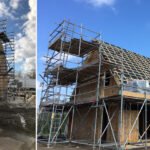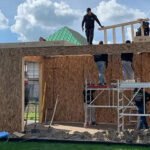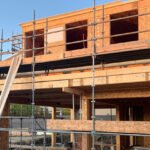
Quacent Expands in Europe: New Partnerships and Projects
The European construction sector is undergoing rapid transformation, with demand for faster, greener, and smarter building systems reaching unprecedented levels. Against this backdrop, Quacent has been steadily expanding its footprint across Europe. Our structural insulated panel (SIP) technology is no longer seen as a niche solution—it is being embraced as a mainstream method for housing, commercial buildings, and public infrastructure.
This blog provides an update on Quacent’s growing presence in Europe, highlighting new partnerships, major projects, and how we are positioning ourselves as a trusted supplier of high-performance prefabricated building solutions.
Why Europe?
Europe is one of the most dynamic construction markets in the world, driven by:
- Housing Shortages: Millions of new homes are needed across the continent within the next decade.
- Strict Regulations: EU climate goals and national building codes demand nearly zero-energy buildings (nZEB).
- Labor Shortages: Traditional methods are struggling due to a shrinking skilled workforce.
- Demand for Sustainability: Developers and investors prioritize energy efficiency and circularity.
These challenges align perfectly with the strengths of Quacent’s SIP technology—fast to assemble, energy-efficient, and fully adaptable to European design and regulatory standards.
Strategic Partnerships
Quacent’s expansion strategy in Europe is built on partnerships. Rather than operating in isolation, we collaborate with local distributors, architects, and builders who understand their regional markets.
Recent highlights include:
- The Netherlands: Partnerships with housing associations and modular home builders to meet BENG standards with SIP-based housing projects.
- Belgium: Collaborations with urban developers for infill projects, where SIPs’ speed and low disruption are major advantages.
- Germany: Cooperation with architects focused on Passive House designs, leveraging SIPs’ airtightness and thermal performance.
- Spain: Joint ventures with eco-resort operators along the Mediterranean coast, delivering vacation housing that combines speed and sustainability.
- France: Partnerships with suburban developers to meet RE2020 standards in large-scale housing developments.
By working with trusted partners, Quacent ensures that our SIP systems are tailored to local building codes, cultural expectations, and customer needs.
Ready-To-Assemble (RTA) Approach
A key factor in Quacent’s success is our Ready-To-Assemble (RTA) SIP kits. Each kit is designed, pre-cut, and packaged by construction phase, including all connectors and fasteners. This makes the on-site process intuitive and efficient, even for contractors with limited prior experience with SIPs.
Advantages of the RTA approach include:
- Faster on-site learning curve.
- Reduced errors and waste.
- Clearer logistics, with panels delivered in the sequence of assembly.
- Smaller crews needed for installation.
Our European partners consistently highlight the RTA model as a game-changer, making SIPs accessible and practical for mainstream construction.
Commitment to Sustainability
Quacent’s European expansion is also driven by our commitment to sustainability. We are actively investing in Environmental Product Declarations (EPDs) and Life Cycle Assessments (LCAs) for our SIP products, ensuring compliance with EU sustainability frameworks.
Our SIPs already deliver:
- High Thermal Efficiency: Reducing operational energy demand.
- Reduced Waste: Off-site prefabrication minimizes site waste.
- Recyclability: OSB facings and Neopor® cores can be recycled.
- Lower CO₂ Footprint: Less on-site machinery, transport, and time means fewer emissions.
This alignment with Europe’s Green Deal and circular economy goals makes Quacent an attractive partner for developers seeking ESG-compliant solutions.
Supporting the Local Workforce
Far from replacing local labor, Quacent’s SIP systems empower European contractors by reducing reliance on scarce skilled trades and simplifying the building process. We provide:
- Training Programs: Hands-on installation workshops for contractors.
- On-Site Support: Supervisors to guide first-time SIP projects.
- Digital Resources: BIM models and technical details for architects and engineers.
This collaborative approach ensures that SIPs are not just imported products, but integrated solutions supported by knowledge-sharing and training.
Looking Ahead
Quacent’s European journey is only just beginning. Our goals for the next few years include:
- Expanding partnerships with more regional distributors.
- Establishing logistics hubs to streamline delivery across Europe.
- Scaling up projects in social housing, eco-resorts, and modular construction.
- Collaborating on EU-funded sustainability initiatives.
By continuing to work closely with local partners, we aim to make SIPs the default choice for sustainable, fast, and cost-effective building across the continent.
Conclusion
Quacent’s expansion in Europe reflects a clear trend: prefabricated SIP construction is becoming the new standard for housing and commercial projects. With strategic partnerships, flagship projects, and a commitment to sustainability, Quacent is not only growing but also shaping the future of European construction.
For developers, contractors, and policymakers, the message is clear: Quacent is ready to deliver faster, smarter, and greener building solutions that meet Europe’s urgent needs.





Add a comment